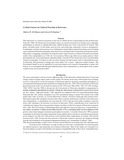Critical factors in cultural tourism in Botswana

View/
Date
2008Author
Bolaane, M.M.M.
Kanduza, A.M.
Publisher
Botswana Society, http://www.botsoc.org.bwType
Published ArticleMetadata
Show full item recordAbstract
This discussion is a critical assessment of the role of cultural factors in promoting tourism in Botswana. From the 1990s, the Botswana Government’s policy on tourism focused on involving local community
participation in tourism by making Botswana cultural heritage one of the cornerstones of tourism. This
policy included goals of alleviating rural poverty and promoting sustainable resource management.
Communities in urban and rural areas were challenged to market their cultural knowledge such as holding
court, traditional Botswana hospitality, performance arts and handicrafts in attracting international tourists.
This policy of engaging communities in cultural tourism caused tension in relations with policies launched
earlier. Since independence in 1966, the Government of Botswana followed economic policies which promoted private sector participation and partnerships. From the 1970s, the private sector was particularly
courted to participate in tourism in order to attract famous and rich tourists such as entertainment actors to Botswana. This promoted a strategy and vision called ‘low volume –high price market tourism’. The
Government hoped to use its reputation for good governance and economic management to attract rich
tourists. It was anticipated that through cultural tourism, local communities in various parts of the country would become involved and benefit.
